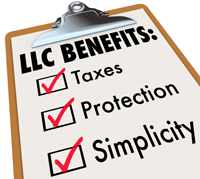|
Woodland Hills Business Law Blog
Tuesday, July 15, 2014

A limited liability company is a very popular business form that combines some of the best features of a corporation and a partnership. Like a partnership, an LLC is taxed through its individual members. Like a corporation, it provides limited liability to its members. In most situations, the personal assets of LLC members cannot be reached for the debts or liabilities of the business. But, also similar to a corporation, there are certain scenarios where personal assets can be reached. Most LLCs have more than one member. In recent years, a variation called the single member LLC has become widely used. As the name suggests, these LLCs have only one member. While the structure and organizational requirements of single member LLCs are essentially the same as ordinary LLCs, there has been some uncertainty as to whether these businesses afford their members the same type of limited liability.
Initially, not all states recognized single member LLCs. Now, all fifty states and Washington, D.C. recognize these business forms and have statutes governing them. Generally, single member LLCs provide personal asset protection to their members for the liabilities of the business. But, they do not always provide the reverse protection that a corporation or ordinary LLC includes. In the case of an ordinary LLC, the personal creditors of the member cannot go after that member’s share without what is referred to as a “charging order”. A charging order is a legal device that allows the creditor to place a lien on the member’s LLC interest. The member’s interest is essentially any distributions made to them by the LLC. Therefore, creditors can collect the members interest but not outright and not without jumping through a number of hoops. In the case of a single member LLC, the charging order protection may not be provided. While some states like Wyoming have specific laws making the charging order protection applicable to these types of businesses, other states, like California and New York, have made no decisions distinguishing ordinary LLCs from single member LLCs. Therefore, in these states it is important to remember that legislation and judicial decisions have the potential to cause serious problems for business owners in the future.
When wrestling with matters of business formation there are many factors that need to be considered and the advice of a seasoned business law attorney can help. Contact our office for a consultation today.
Sunday, June 29, 2014

A franchise agreement is a contract that governs a franchise relationship. These agreements are entered into by the franchisor, the entity that owns the business model, and the franchisee, the individual or entity that will run a location of the business. While the terms of each contract are unique to the particular deal, most include similar provisions.
Most franchise agreements will include provisions describing where the franchise will operate and whether that territory is exclusive. The agreement will also detail how long the franchise relationship will last.
These contracts will most likely include terms regarding franchise fees and royalties the franchisee will have to pay the franchisor. The agreements will also usually contain provisions relating to how the franchise is to be run on a day to day basis, including details as to what training is to be provided by the franchisor.
Terms relating to intellectual property owned by the franchisor are very important in franchise situations. Franchise agreements include provisions instructing how patents, trademarks and copyrights can be used by the franchisee. Advertising terms are also usually included in these contracts as it is likely that the franchisee will have to contribute toward advertising costs.
Termination and renewal terms are also essential parts of a franchise agreement. These detail how the franchise relationship can be ended before the natural expiration and how the relationship can be revived if the parties so choose. It is also common to find terms relating to disputes that may arise between the franchisor and franchisee and how these disputes are to be resolved. This is where alternative dispute resolution and choice of law clauses may be utilized. Terms relating to the resale of the franchise might also be present, as many franchisee’s have this option, although there may be a right of first refusal clause accompanying it. This would provide the franchisor with the option of buying back the franchise before anyone else.
Franchise agreements determine all of the details of the franchise relationship and therefore must be clear and understood by all parties. They can often be complex and it is therefore of the utmost importance to consult with a business law attorney who has experience with franchise law to advise you and negotiate with the franchisor.
Sunday, June 15, 2014

There are different types of commercial leases, such as gross leases, modified gross leases and net leases. One variation of the net lease is a “triple net” lease, in which the tenant is liable for a net amount of property taxes, insurance and common area maintenance relating to the property they are possessing. Most of the time, additional fees in the form of common area maintenance expenses come up in the context of a triple net lease. Landlords ask tenants to pay these fees so that they contribute to the cost of maintaining common areas such as entranceways, walkways, parking lots and hallways, as well as services enjoyed by the tenant such as janitors, security and landscapers. These fees are in addition to a rental payment and can be substantial depending upon the situation.
It is essential that a business owner be informed about the terms of the lease they are entering into, especially if these terms have the potential to cost them money. As common area expenses can be a significant cost they are often controversial and hotly negotiated. Most of the disagreements over these terms relate to the distinction between costs for the maintenance of common areas and expenses that are primarily the landlord’s responsibility. Generally, the test is who will benefit most from the expense, the tenant or the landlord. For example, it can be argued that tenants should not be paying for improvements that are being done to increase the value of the property as the landlord will be the primary beneficiary of these improvements.
When negotiating common area expenses, the business owner should inquire as to the purpose of the payments. They should also ask whether they will be able to review what the money is being spent on at any given time. Business owners should seek the advice of an attorney as they will be able to explain many of the options available to them. For example, there might be an opportunity to ask for a capped or fixed rate. Most importantly, they should be informed about their legal options in the event of a dispute.
If you are signing a commercial lease and will be responsible for common area expenses, it is in your best interest to consult with a business law or real estate attorney before signing on the dotted line.
Sunday, June 8, 2014

There are a number of reasons to dissolve a general partnership. Whether business is not going well, you can’t get along with your business associates or you are ready to retire, it might be time to end your partnership. Before making the final decision, you should consider whether dissolving the partnership is the only option. Is there any other way to alleviate the problem? Could you buy out your partner or simply sell your share allowing the business to continue under different management? Dissolution is generally not a simple process, and if it is your only option, it’s important that you be aware of some important issues that may be present. Most partnerships operate pursuant to a partnership agreement. Sometimes, these agreements include provisions for dissolution. If this is the case in your partnership you should follow these provisions closely to avoid later disputes. If there is no partnership agreement, you should try to formulate a dissolution strategy with your partner(s). This might not be possible, especially if the dissolution is the result of a disagreement or personality clashes. In this case, you have the option to pursue alternative dispute resolution such as arbitration or mediation, as well as the ability to litigate. Litigation is expensive and time consuming and therefore might not be the best choice. When preparing to dissolve a partnership you should try to collect all of the money owed to the business and pay any debts the partnership may have. You should also inform the IRS and the state of the dissolution for tax purposes. These tax agencies will give you the information you need with regard to taxes. It is also a good idea to consult with an attorney regarding tax matters as they can result in penalties if not dealt with correctly. You should also be concerned with making the dissolution formal. In order to do this, you should apply for a Certificate of Dissolution with the state. Each state has different requirements and it is therefore a good idea to speak with a qualified attorney regarding this matter. The benefit of formally dissolving your partnership is that it will protect you from debts and contracts entered into after the dissolution is final. Depending on the type of partnership you are involved in, different concerns may be present. Partnership dissolution is not always as straight forward as it may seem. In order to handle matters appropriately, you should talk to an experienced business attorney.
Sunday, May 25, 2014

Whether you are an owner considering whether or not you should sell your small business or an individual thinking about buying a business that is on the market, it is important to determine how much the business is worth. This can be a daunting task. Every business is different and for that reason no single method can be used in every case. Below are the most common methods used to determine the approximate value of a small business. The assets a business holds can be used to determine its approximate value. Generally, a business is worth at least as much as its holdings, so looking to tangible and intangible assets can provide a baseline amount. If you choose to use this method, the business’ balance sheet should provide all of the information you need. This method may be too simple to be used for all businesses, especially those that are doing well and generating a lot of profits. Another way to determine a business’ worth is to look at its revenue. Of course, revenue is not profit a business makes. When using this method, a multiplier is applied to the revenue amount to determine the business value. The multiplier used is dependent upon the industry in which the business is operating. Another method is to apply a multiplier to the business’ earnings or profits, instead of total revenue. This is usually a more accurate way of determining what the business value actually is. When using these methods, it is important to understand that the market is constantly fluctuating. The value of assets can go up or down depending on the day, and revenue and earnings can change drastically from year to year. Also, when trying to determine what a business is worth, you might consider what the business may be worth if it had better management or more optimal business execution. The current managers may not be taking advantage of various opportunities to make the business more profitable. Before entering into any purchase or sale agreements, it’s essential that you consult a qualified business law attorney and a business appraiser who can assist in the valuation of a small business and help you understand whether it makes sense to proceed with the transaction.
Thursday, May 15, 2014

If you are a business owner, you will likely consider hiring an independent contractor to assist with one, or multiple projects. Independent contractors can be beneficial in a variety of situations and should not be overlooked as assets to your business. It is important for management to understand how these workers are classified and the legal implications that may result from working with them. Independent contractors are those that provide services to an individual or business but that retain control over how those services are rendered. In an employer-employee situation, the employer has control over what the employee does and how he does it. When it comes to independent contractors, employers have much less control. This level of control is one of the determining factors when it comes to classifying workers as employees or independent contractors. Control comes in varying degrees and might refer to many different aspects of the employment; this may include scheduling, the methods and techniques that a worker uses, training, where the work is done and the frequency of the work. There is no one test or bright line to determine if someone is an employee or an independent contractor and all factors have to be taken into consideration in each case. Sometimes, the details of employment are agreed to in a contract. If you’re considering hiring an independent contractor, you should enter into a formal contract with them up front in order to avoid confusion in the event of a conflict. There are some benefits to working with independent contractors. Generally, employers are not liable for the negligent conduct of an independent contractor. This rule varies from state to state and is subject to many different exceptions. Also, these workers are usually exempt from many of the employment laws that apply to regular employees, such as wage and overtime restrictions. Business owners also have different tax liability when it comes to these workers, in that they are not responsible for deducting payroll taxes from their wages. This is not to say that businesses should use these workers for every task. In many situations, employees are preferable to independent contractors. If you are interested in hiring an independent contractor or are in need of a contract relating to the use of this type of worker, you should contact a qualified attorney today.
Monday, May 5, 2014

Corporate bylaws are a critical component in the foundation of any corporation. Generally speaking, the bylaws establish the rules for internal operations and governance. While business owners have a large degree of control when it comes to the bylaws, they must be in compliance with state law. Some states have strict mandates on what information must be included, while others may not specify exactly what must be covered and there may not be a set format. However, there are certain things that are typically covered in a company's bylaws.
Bylaws often set forth what officers the company is to have, what the responsibilities are for those officers, and how they are elected. It will also set forth the term of office such as a one, two, or three year term. Most companies also have a board of directors. The bylaws would also set forth how many board members are allowed or required and their term of office. Most of the time the shareholders will elect the board members, and then the board members will elect or appoint the officers of the company. So, the officers report to the board, and the board reports to the shareholders.
Other matters that are often found in the bylaws include the procedure for notifying the board of an upcoming meeting and the timeline for doing so. In addition, the bylaws can establish the number of board members that are required to be present at a meeting for there to be a “quorum” in order to do business and how many votes are needed for something to be approved. One thing that likely will not be in the bylaws but you might want to consider if there will be multiple owners of the business, is a buy-sell agreement. That agreement would outline rights and responsibilities for each owner and generally would provide the right or option to buy out a co-owners’s shares.
It’s important to consult with a business law attorney to make certain that your bylaws are in compliance with all applicable state statutes. Your attorney may also help you identify potential pitfalls and minimize any future risks that might harm your company down the line.
Monday, April 28, 2014

Buying an Existing Franchise
While purchasing and establishing a new franchise unit may seem easier than starting from scratch with your own business model, it is still a time consuming and expensive undertaking. Franchisees must find a location, make needed renovations and secure various licenses or permits. Of course, even after the business opens its doors, it will take more time to acquire loyal customers and generate revenue. With big expenses and minimal revenue, it should come as no surprise that most new businesses operate in the red for the first year or two. If you are an aspiring entrepreneur who is looking to hit the ground running, it might be a good idea to avoid the laborious setup process and consider buying an existing franchise, often referred to as a “resale.”
As with any business venture, buying an existing franchise can be profitable and rewarding but it doesn’t come without risks. If you are contemplating the purchase of an existing unit, consider the following:
Get to Know the Franchisor
Although you will own the unit, you will have to continuously work with the franchisor. It’s important that you take time to understand the company’s approach to business, what type of resources they will provide to you and understand any requirements that might be set forth for the businesses that bear its name. Take time to speak with other franchisees to learn about their experiences as owners and carefully review the Uniform Franchise Offering Circular (UFOC).
In some cases, the franchisor may have a right of first refusal meaning that they ultimately have a say in whether you can join the franchise group as an owner. A business law attorney can help you sort through these issues and position you for success.
Identify the Real Reason the Existing Owner is Trying to Sell
There may be many reasons why a current franchisee is looking to sell his or her unit. In some cases, it may be because the owner is planning to retire or wants to relocate. In other situations, you may find that the business isn’t profitable and the owner wants to cut his losses and try his hand at something else. Understanding the reason for sale will help you to better understand whether it makes sense for you to buy the business. If it is a failing franchise unit, you have to reasonably ask yourself if you will be able to turn it around. On the other hand, a retiring owner may have amassed a loyal customer base which will help you to be immediately profitable.
Review the Current State of the Unit
During the discovery process, it’s imperative that you carefully review all of the financials for the resale unit. You will also want to look at things like employee turnover and speak to current employees to learn whether or not they are interested in continuing on with the business once ownership is transferred. If not, you may have the burden of hiring and training a new team very early on. Another thing you will want to examine is the state of the building and equipment – has everything been serviced regularly? A repair to a machine may seem minor but it could cost you a great deal.
The sale of an existing franchise unit can be complex. Not only do you have to understand the motives and terms of the seller, but you must also understand the role and requirements of the franchisor. Due to the complicated nature of these types of transactions, it’s absolutely imperative that you consult a business law attorney who can help you perform your due diligence and make sure all of the proper legal steps are taken during the transaction.
Wednesday, April 16, 2014

Opening a new restaurant? Some key legal considerations for restaurateurs
Each year, approximately 30,000 new restaurants are opened in the United States. Most restaurateurs understand the great risk that comes with these ventures; in fact, some sources estimate as many as 18,000 of the 30,000 restaurants opened this year will fail within the first three years in business. Despite the risk, many chefs and hospitality professionals dive right in. If you’re a hopeful restaurateur, legal planning is an absolute necessity to ensure you don’t fall victim to many of the common mistakes that cause these businesses to fail. Consider the following:
Business Entity
All restaurant owners must carefully consider the best corporate structure for their businesses. Generally speaking, there are four types of structures: a sole proprietorship, a partnership, a limited liability company (LLC) or a corporation. In the case of a restaurant, most owners will want to limit liability, and protect personal assets, should there be a lawsuit filed by a customer or employee. An LLC or corporation is often recommended for restaurants since these limit personal liability. A qualified business law attorney can help you identify which structure is best for your new restaurant, and help you prepare and file all required documents.
Zoning
As any successful restaurateur will tell you, a good location is key to a profitable restaurant. In considering the location of your restaurant, you will want to take into account the local zoning laws. Some areas are restricted to residential dwellings while others may be zoned for commercial use. Do you want to have outdoor seating in the summer? That too may be subject to zoning restrictions. Be sure to carefully outline how you plan to use the space and then identify possible locations accordingly.
Leasing a Space
If you don’t have the capital to buy a space for your restaurant, you’ll likely have to rent one. In many cases, costly renovations are required (especially if the space was not previously used for a restaurant). When a significant amount of money is put into the space upfront, it’s absolutely essential that you take steps to protect your tenancy and ensure your business can afford to stay there for an undetermined amount of time. This might mean negotiating a favorable a long-term lease, and including specific clauses pertaining to rent increases. A lawyer with experience in the restaurant industry should be consulted early in the process to ensure your best interests are protected.
Licenses and Permits
Unlike many other types of businesses, restaurants often require a number of licenses and permits from local governing bodies. For instance, you might be required to obtain a license to handle food. If you want to have a bar, you will need a liquor license. Even if you plan to have patron dancing, you may be required to obtain a special permit. An attorney can help you identify exactly what you will need and help you complete all applicable paperwork.
Patron & Employee Safety
To ensure the safety of all patrons, your local governing agency may require your restaurant to undergo regular inspections from the health department. To ensure the well-being of all employees, you should also review all Occupational Safety and Health Administration policies.
Insurance
If you frequent restaurants, you’ve likely witnessed an accident or two - a server spills a hot cup of coffee all over a patron or a bartender slips on some water from the ice machine. With the risk of injury high, it’s absolutely critical that all restaurant owners select an insurance policy which protects the business against lawsuits. In selecting the best policy, speak with an insurance agent and knowledgeable attorney who have restaurant experience to ensure you are protected.
Intellectual Property
You have probably thought long and hard about your restaurant’s name, signature recipes and even your tagline. Since these components are all critical to your branding and long-term success, you should take steps to protect them. An attorney can help you register the name of your restaurant or food creation as a trademark.
Franchises
If you are purchasing a franchise, you will have even more legal considerations including the time consuming review of the disclosure document and the often daunting franchise agreement.
Opening a restaurant has its fair share of challenges, especially when compared with many other types of small businesses. By addressing potential legal pitfalls, restaurateurs can focus on operational aspects of their business and enhance their chance of success. It’s absolutely essential that you consult an attorney with experience in the restaurant industry early on to reduce risk and expense down the road.
Wednesday, April 9, 2014

Changing Your Business Entity from a Sole Proprietorship
What does the transition entail?
There are various ways you can restructure the legal framework of your company if you wish to add a partner to your sole proprietorship, though each option has different requirements. It's possible to merely act as "partners" without any formal agreement, but that's generally not a good idea. The smart choice is to create a business entity, such as a corporation or limited liability company.
Here are a few facts and considerations to keep in mind as you restructure your company from a sole proprietorship to another business entity.
Create a Corporation With Your New Partner
To do so you would first need to decide upon a name and then, assuming that name is not already taken in your state, file articles of incorporation with your secretary of state. You would next apply for a tax identification number with the IRS, and you may have to file other documents with your state's department of revenue or other agencies. It's best to seek the advice of a tax attorney and/or your CPA as to whether your corporation should elect to be taxed as what is known as an "S-Corporation." If so, elect that option on the tax identification number application form. The company should have bylaws, initial minutes and a buy-sell agreement.
Form the Entity as a Limited Liability Company (LLC)
This is also done through your secretary of state and the steps are similar to what must be done for a corporation. You would still apply for a tax ID number in the same manner. The LLC will have options as to how it is to be taxed. It also could elect to be taxed the same as an S-Corporation, or it could elect to be taxed like a partnership. These are important factors and you should seek the advice of a tax attorney and/or CPA.
This is an important step in your business and taking on another owner carries with it a number of legal issues that must be addressed in order to proceed. Review the above information with your attorney so they may properly advise you on a course of action.
Changing Your Business Structure
What about a buy-sell agreement? Also known as a shareholders agreement, this is a contract between you and your partner that would address the right of one of you to buy out the other upon the happening of certain events. Those might include disability, death, divorce, and a number of other events. Keep in mind that you should transfer ownership of at least some assets from your sole proprietorship to one of the aforementioned entities when restructuring your business.
Wednesday, March 26, 2014
3006.jpg)
Do I need to file a DBA for my small business?
Selecting a name for your business can be challenging. It must be unique, memorable and representative of your product or service. Depending on the name you ultimately choose, you may also need to file for a DBA.
Simply defined, DBA stands for “Doing Business As.” A DBA is a fictitious business name, also referred to as an assumed business name, that differs from the personal name of the owner(s) or the official name of a registered corporation. For example, if Patricia Smith is a sole proprietor and opens her bakery under the name of Patty’s Cakes, the bakery would have an assumed name because it is not the owner’s legal name.
DBAs are a form of consumer protection, giving customers insight into the individuals or corporation that they’re really hiring or purchasing a product from. Generally speaking, there are two instances where a DBA will be needed:
- A sole proprietor or partnership where the owner(s) names are not used.
- An existing corporation or LLC wants to do business under a different name. This may occur when a new product is launched or the company is looking to expand into a new industry.
For sole proprietors, who operate under an assumed name, a DBA is often required to open a bank account and start accepting payments for the business. It’s important to note that not all states require the registration of a DBA. Furthermore, a DBA is not a substitute for a trademark which requires a separate application that must be filed with the United States Patent and Trademark Office. If you are looking to start a business under a fictitious name, it’s imperative that you consult a business attorney who is familiar with the business formation laws in your county and state. When registration is required, this can generally be done with the county clerk’s office or your state government.
The Law Offices of Joseph J. London assists individuals and businesses with Commercial and Residential Real Estate Transactions, Franchise Law, Business Transactions, Corporate/Partnership/LLC Transactions and Dispute Resolutions in the San Fernando Valley, CA including Woodland Hills, Tarzana, Canoga Park, West Hills, Winnetka, Topanga, Reseda, Encino, Northridge, San Fernando, Sherman Oaks, North Hollywood, and Van Nuys, as well as Los Angeles, Malibu, Santa Monica, Thousand Oaks, Burbank and Pasadena in Los Angeles County, Ventura County, Orange County, Riverside County and San Bernardino County.
|

|
|
|